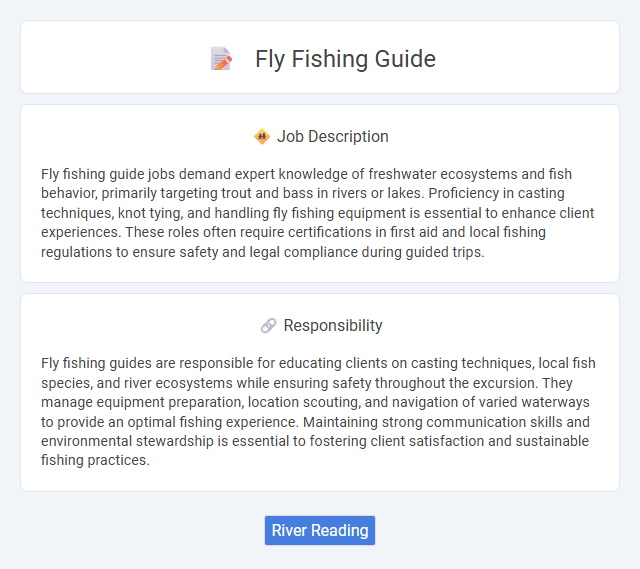
Fly fishing guide jobs demand expert knowledge of freshwater ecosystems and fish behavior, primarily targeting trout and bass in rivers or lakes. Proficiency in casting techniques, knot tying, and handling fly fishing equipment is essential to enhance client experiences. These roles often require certifications in first aid and local fishing regulations to ensure safety and legal compliance during guided trips.
People who enjoy outdoor activities and have a passion for fishing will likely find fly fishing guide jobs suitable and rewarding. Individuals with patience, strong communication skills, and physical endurance may be better equipped to handle the demands of guiding clients through various fishing environments. Those prone to seasickness, discomfort with variable weather, or limited physical stamina might find this job challenging.
Qualification
A fly fishing guide must possess expert knowledge of local waterways, fish species, and fly fishing techniques to ensure a successful and safe experience for clients. Certifications in first aid, fishing licenses, and experience in customer service enhance their credibility and professionalism. Strong physical stamina and excellent communication skills are essential for effectively teaching casting methods and navigating challenging terrains.
Responsibility
Fly fishing guides are responsible for educating clients on casting techniques, local fish species, and river ecosystems while ensuring safety throughout the excursion. They manage equipment preparation, location scouting, and navigation of varied waterways to provide an optimal fishing experience. Maintaining strong communication skills and environmental stewardship is essential to fostering client satisfaction and sustainable fishing practices.
Benefit
Working as a fly fishing guide likely offers significant benefits such as the opportunity to connect with nature and enjoy outdoor environments daily. It probably provides a chance to develop expert skills in fly fishing techniques and local aquatic ecosystems. There is a good chance it also offers flexible seasonal work and the potential for tips, enhancing overall income.
Challenge
Fly fishing guide jobs likely present a unique set of challenges due to unpredictable weather conditions and varying fish behavior. Navigating remote and rugged environments may require strong problem-solving skills and physical endurance. Guides probably need to adapt quickly to ensure client safety and satisfaction during each trip.
Career Advancement
Fly fishing guides gain valuable expertise in aquatic ecosystems and angling techniques, positioning them for advancement into roles such as outfitters, lodge managers, or outdoor education instructors. Mastery of customer service and safety protocols enhances their credibility and opens opportunities in tourism and adventure sports management. Continuous skill development in species identification, casting methods, and gear maintenance supports specialization and long-term career growth.
Key Terms
River Reading
Mastering river reading is essential for any fly fishing guide to locate prime fish habitats and anticipate fish behavior effectively. Understanding water currents, depths, and underwater structures allows guides to select optimal casting spots and techniques, increasing the chances of successful catches. Expert river reading not only enhances client satisfaction but also ensures safety in dynamic fishing environments.
 kuljobs.com
kuljobs.com